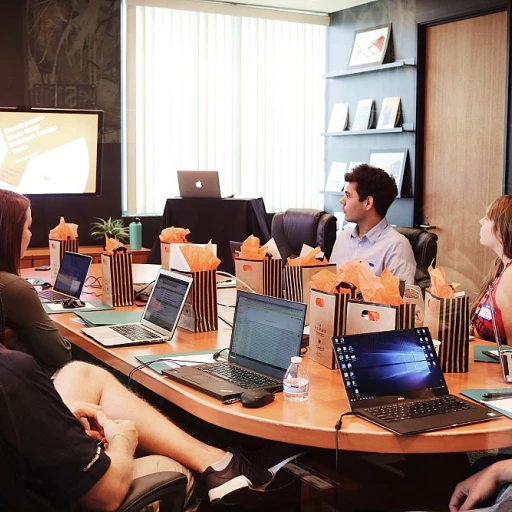
Understanding the Importance of Virtual Team Building
Why Virtual Team Building Matters
In today's fast-paced world, remote work is increasingly becoming the norm. As organizations try to adapt to this change, the need for creative and engaging virtual team-building activities is more crucial than ever. These activities are not just a nice-to-have addition; they're essential for ensuring that team members feel connected and motivated while working from different locations. The experience of a unified team is vital for productivity and satisfaction.
By investing time in virtual team-building activities, companies can help teams develop meaningful relationships and improve communication skills. It creates a sense of belonging, especially important for remote teams who may feel isolated. Engaging activities such as virtual escape rooms, trivia games, or even a murder mystery can transform a routine workday into a fun and memorable experience for team members. When executed well, these activities also enhance problem-solving skills—a critical competency in any workplace.
Another important aspect of virtual team-building activities is their ability to accommodate diverse teams with varying interests and preferences. From virtual trivia to collaborative online challenges, there's something for everyone. Activities should cater to different personalities, ensuring that each team member finds value in the experience.
Ultimately, the best virtual team-building activities are those that balance enjoyment with meaningful outcomes. They should not only be fun but also serve as effective tools for building strong, cohesive teams that will stand the test of time. And as teams engage in these activities, the benefits will naturally extend to improved productivity, newfound skills, and an enhanced sense of camaraderie.
Creative Icebreakers for Virtual Meetings
Innovative Methods to Break the Ice Remotely
Virtual meetings can sometimes feel impersonal, especially for remote teams that might not get the chance to meet face-to-face often. Implementing creative icebreakers can make a significant difference in setting a positive tone and encouraging engagement. One simple yet effective activity is the "Two Truths and a Lie" game. Team members share two truths and one lie about themselves, and the rest have to guess which statement is false. This not only sparks conversation but also helps people learn quirky tidbits about their colleagues. Another option is hosting a virtual trivia session. Choose topics that resonate with your team or mix it up with general knowledge to cater to diverse interests. Trivia games energize participants, encouraging a bit of friendly competition while testing their memory and knowledge. It's a fantastic way to weave fun into routine meetings. For teams interested in a longer, immersive experience, consider a virtual escape room. These online challenges require team members to collaborate, solve clues, and "escape" within a set time limit. Escape rooms promote team bonding and problem solving, working as both a great team building activity and an engaging entertainment option. Don't underestimate the power of small gestures either. Asking each team member to bring a personal object that tells a story can pave the way for deeper connections. Video conferencing platforms make this effortless and can lead to shared experiences and stories that bridge the virtual gap. Incorporating these activities not only livens up meetings but contributes to strengthening team dynamics over time. For more insights on creating impactful team experiences, consider exploring agile solutions tailored for digital transformation here. Integrating variety into your team building activities ensures that each session remains fresh, memorable, and effective in achieving its ultimate goal: fostering a unified and connected virtual team.Collaborative Online Games and Challenges
Immersive Games That Engage and Challenge
When it comes to keeping your virtual team engaged during team building activities, online games and challenges offer a great avenue. These activities not only bring excitement but also foster collaboration and improve problem-solving skills.
One of the best online team games to consider is the virtual escape room. It's a fun way for team members to work together on solving puzzles and finding clues, promoting communication and team bonding. Many platforms provide virtual escape experiences that can be customized based on the preferences of your team, ensuring every session is unique and beneficial.
Another engaging activity is the classic murder mystery game. This game requires team members to take on roles and collaborate to solve whodunnit mysteries, which can enhance critical thinking and involvement. It encourages team members to think outside the box and improves their ability to work under time constraints.
If you're looking for something simpler yet effective, virtual trivia games are a popular choice. These games are not only fun but can be tailored to suit your team's interests or even focus on industry-related topics. Trivia games are a great way to build team spirit while also incorporating a competitive edge.
Lastly, consider organizing a virtual book club. It serves as a non-traditional way for team members to connect over shared interests while improving their speaking and presentation skills. By discussing books, team members can practice critical thinking and develop a sense of culture within the group.
Each of these online games can help team members experience a different side of their peers, making it an excellent opportunity for growth and understanding within remote teams. Additionally, exploring other emerging technologies, as discussed in this AI-powered executive assistance article, can further enhance our team building strategies.
Virtual Workshops and Skill-Sharing Sessions
Virtual Workshops: A Platform for Skill Exchange
Virtual workshops offer a dynamic way for team members to share and enhance their skills. These sessions can be tailored to fit the unique needs of your remote team, providing a platform for both learning and teaching. By encouraging team members to lead workshops on topics they are passionate about, you not only foster a culture of continuous learning but also empower individuals to take ownership of their expertise.
Incorporating skill-sharing sessions into your virtual team building activities can be a game-changer. These workshops can range from technical skills like coding or graphic design to soft skills such as communication and leadership. The key is to make these sessions interactive and engaging, ensuring that all team members feel involved and valued.
Interactive Skill-Building Activities
To keep the energy high and the experience enjoyable, consider integrating interactive elements into your workshops. This could include live demonstrations, hands-on activities, or even virtual escape rooms that require problem-solving and teamwork. These activities not only make the learning process fun but also help team members bond over shared challenges and successes.
Another great idea is to host a virtual book club where team members can discuss insights from industry-related books. This not only promotes learning but also encourages team bonding over shared interests. Additionally, incorporating virtual trivia games related to the workshop topics can add a layer of fun and competition, making the learning experience memorable.
By dedicating time to these skill-sharing sessions, you help team members feel more connected and invested in their work. It's a win-win situation where both the individual and the team benefit from the collective knowledge and experience.
Interactive Storytelling and Role-Playing Activities
Immersive Narratives and Character Engagement
Engaging with team members through interactive storytelling and role-playing presents a unique opportunity to dive into a world of creativity and problem-solving. Largely driven by virtual settings, these activities help team members step into different roles, enhancing not just their imagination but also their ability to collaborate effectively. Incorporating a virtual escape room or a murder mystery game into your team building arsenal can offer immense benefits. Such activities require team members to work together, decipher clues, and solve puzzles, boosting their analytical skills and fostering a sense of unity. The collective triumph at the end of such a game often results in a shared sense of achievement, nurturing deeper bonds. For a more relaxed yet equally engaging experience, book clubs serve as a fabulous substitute. By discussing a chosen book, team members share perspectives and expand their understanding on various topics. This not only enhances the scope of knowledge within the team but also establishes a platform for open communication. To ensure that these activities remain dynamic, consider experimenting with interactive storytelling using video conferencing tools. Encourage members to weave narratives together, with each adding a piece to the storyline, thus promoting involvement across teams and providing an enjoyable twist to the traditional storytelling approach. These role-playing and storytelling activities are vital in the broader spectrum of virtual team building. Together with creative icebreakers, collaborative games, and skill-sharing workshops, they create a robust environment where remote teams can strengthen their work relationships while having fun.Feedback and Reflection Sessions
Reflect and Improve with Feedback Sessions
Creating an engaging virtual team building activity doesn’t end once the video conferencing call wraps up. Incorporating feedback and reflection sessions can be vital for the ongoing success and improvement of your team building efforts. These sessions provide an opportunity for remote teams to discuss what worked and what didn’t, ensuring that future activities continue to be effective and exciting. Initiating feedback sessions helps team members voice their experiences and opinions. It’s important to create an open environment where everyone feels comfortable sharing insights. You can employ various methods, such as anonymous surveys, to gather honest feedback. Using a mix of online tools and direct communication can yield the best results. Encouraging team members to share their thoughts on different activities, like virtual escape rooms or team bonding games, can spark discussions that lead to improvements. During feedback sessions, it’s crucial to focus on the positives as well as areas needing development. Celebrate the aspects that fostered team building, like creative icebreakers or collaborative challenges. Highlighting achievements strengthens remote teams' morale and reinforces the value of these activities. Reflection doesn’t stop with feedback collection. Analyzing data collected from team members allows managers to pinpoint which activities were great and which may need adjustments. This information helps refine future virtual experiences, ensuring they're informative, fun, and engaging. For instance, if a virtual trivia game wasn’t well-received, explore why it might not have resonated with the team. Was it a lack of interest, or perhaps technical issues that hindered enjoyment? Identifying such challenges and consulting the team about possible solutions can lead to more successful virtual team building in the future. Remember, involving team members in planning future activities not only increases engagement but also fosters a sense of ownership. Each feedback session is a step towards optimal remote work experiences, enhancing problem-solving skills and team cohesion.These sessions are an essential link between the various virtual activities, from interactive storytelling to virtual workshops. The continuous cycle of feedback and reflection ensures that each activity is more impactful than the last, engaging team members and improving remote work dynamics significantly.













